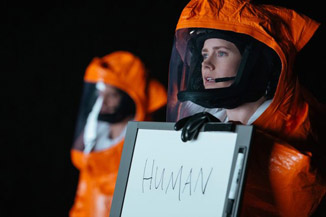The 400-Word Review: Arrival
By Sean Collier
November 14, 2016
Among genre films, few scenarios are presented with more frequency than the idea of first contact. Another race appears on or near Earth; what are we going to do about them? Most frequently, we attack (usually, but not always, after they attack us).
So while the concept of Arrival is nothing new, the question it raises is thoroughly fresh: If we ever receive extraterrestrial houseguests, how will we learn to communicate with them?
And what will we say?
Directed by Denis Villeneuve, most recently seen at the helm of the underrated Sicario, and based on a short story by Ted Chiang, Arrival opens with a dozen toenail-shaped ships suddenly taking up residence at seemingly unconnected points around the globe. World governments diverge on a response, but all begin working on the essential question: So what are these things doing here?
Dr. Louise Banks (Amy Adams), a renowned linguist, is called in to try and figure out a way to interpret what may or may not be an alien language; everyone’s keeping quiet publicly, but there are actual creatures on those ships, and they seem to be trying to chat. She’s paired with a theoretical physicist (Jeremy Renner) and sent to serve as the planet’s first intergalactic translator.
The remarkably artful, Kubrickian direction and composition of Arrival more than makes up for the film’s lack of what we could consider traditional sci-fi action. Everything in this movie is about interruption; sound, light, people and objects jut into frame and out of the soundtrack, keeping the audience in a perpetual, paranoid unease. Meanwhile, the exhausted and stunned performance given by Adams — perpetually in the running for most reliable actress in Hollywood — carries the film, alongside typically strong work from Renner and Forest Whitaker as the pair’s military handler.
As was the case in 2014’s Interstellar — which, like I expect Arrival might be, was misunderstood and underappreciated — the film also insists on binding human emotion to theoretical, cosmic dilemmas. Audience response has proven that to be a treacherous route; many moviegoers seem to like their sci-fi procedural (see The Martian as the best example).
For those willing to take this ride, however, Arrival is a masterfully made work of science fiction, and one I’m inclined to revisit and study. In an era where too many event pictures want to hold our hands, this one instead asks us to understand.
My Rating: 10/10
|
|
|
|




